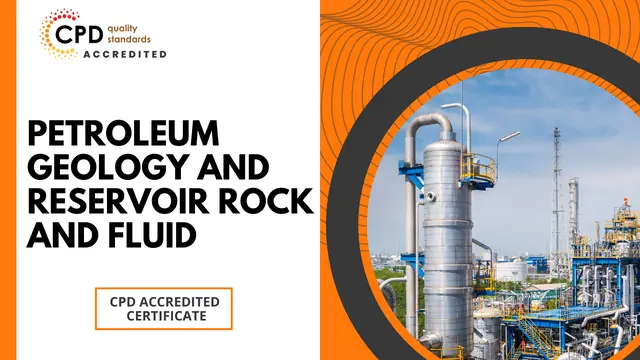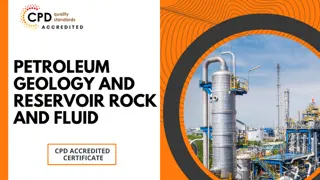
Petroleum Geology and Reservoir Rock and Fluid
Advanced Learning Materials | Certificate Accredited by CPD | Lifetime Access | 24/7 Expert Tutor Support
Study Booth
Summary
- Digital certificate - £4.99
- Hard copy certificate - £9.99
- Exam(s) / assessment(s) is included in price
- Tutor is available to students
Add to basket or enquire
Overview
Explore the fascinating world of Petroleum Engineering with our comprehensive course on Petroleum Geology and Reservoir Rock and Fluid. Gain a deep understanding of the exploration and extraction of valuable resources from the earth's crust.
Through engaging modules, you'll delve into the intricacies of petroleum geology, reservoir engineering, drilling processes, and the future of energy. Prepare yourself for the dynamic field of Petroleum Engineering.
Learning Outcomes:
- Understand the fundamentals of Petroleum Engineering and its role in the exploration and production of hydrocarbons.
- Analyse reservoir rock and fluid properties to optimise the extraction process.
- Familiarise yourself with drilling contracts, rig crew management, and the drilling rig system.
- Anticipate the impact of petroleum engineering on the environment and explore sustainable energy alternatives.
- Evaluate the future trends and challenges in the petroleum engineering industry.
- Discover the significance of petroleum engineering in addressing global energy demands.
- Gain the skills and knowledge necessary for a successful career in petroleum engineering.
- Explore the interdisciplinary nature of petroleum engineering and its connections to other scientific fields..
CPD
Course media
Description
The course equips you with the knowledge of reservoir Petroleum Engineering techniques, encompassing both oil and gas reservoirs. You'll learn about well tubing flow and well intervention strategies, gaining a holistic understanding of the drilling process. Furthermore, we delve into drilling contracts, rig crew management, and the components of a drilling rig system.
So, why people in the UK should learn about Petroleum Geology and Reservoir Rock and Fluid:
- Petroleum is a major source of energy in the UK. The UK is the 12th largest producer of oil in the world and the 9th largest producer of natural gas. In 2020, the UK produced 1.42 million barrels of oil equivalent per day.
- The UK has a long history of petroleum exploration and production. The first oil well in the UK was drilled in 1859. Since then, the UK has developed a significant petroleum industry, which employs over 30,000 people.
- The UK is a major centre for petroleum research and development. The UK has some of the world's leading universities and research institutes that are working on developing new technologies for petroleum exploration and production.
Join us on this educational journey and unlock a world of possibilities in the field of petroleum engineering!
Certification
Upon completing the course, you can obtain a certificate titled Introduction to Petroleum Engineering and Exploration. Certificate options include a PDF Certificate at £4.99, a hardcopy for UK- delivery at £9.99, or a hardcopy for international delivery at £14.99.
Who is this course for?
- Aspiring engineers seeking a strong foundation in the field of petroleum engineering.
- Geoscientists interested in understanding Petroleum Engineering.
- Energy enthusiasts who want to explore the fascinating world of oil and gas exploration.
- Professionals working in Petroleum Engineering-related industries looking to enhance their knowledge.
Career path
- Reservoir Engineer: £50,000 - £90,000 per year
- Petroleum Geologist: £45,000 - £85,000 per year
- Drilling Engineer: £55,000 - £95,000 per year
- Production Engineer: £50,000 - £90,000 per year
- Energy Consultant: £60,000 - £100,000 per year
Questions and answers
Currently there are no Q&As for this course. Be the first to ask a question.
Certificates
Digital certificate
Digital certificate - £4.99
Hard copy certificate
Hard copy certificate - £9.99
Hardcopy Certificate for International Students: £14.99
For students outside of the United Kingdom, this option ensures delivery of a high-quality, professionally printed certificate to your international address for only £14.99.
Reviews
Currently there are no reviews for this course. Be the first to leave a review.
Legal information
This course is advertised on reed.co.uk by the Course Provider, whose terms and conditions apply. Purchases are made directly from the Course Provider, and as such, content and materials are supplied by the Course Provider directly. Reed is acting as agent and not reseller in relation to this course. Reed's only responsibility is to facilitate your payment for the course. It is your responsibility to review and agree to the Course Provider's terms and conditions and satisfy yourself as to the suitability of the course you intend to purchase. Reed will not have any responsibility for the content of the course and/or associated materials.





